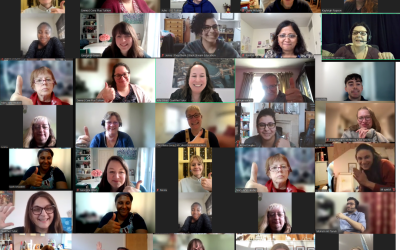
One very refreshing aspect of working with Nudge Education was that we were encouraged to show up with love.
The kind of love that says, I see you as you are and I accept you.
The kind of love that says, I believe that you are doing the best you can with the tools you have available to you and I want to help you grow your toolbox.
The kind of love that says, what’s happened to you isn’t your fault, and I know that you find it really hard to trust but I am going to show you, through my actions, that it is possible to practise that again.
I don’t think I have spoken to a single tutor in our community who doesn’t love what they do. Sure, there are times when it’s difficult to show up to work, we get worn down by all of the things beyond our control. Sometimes we find it really hard to show up for that particular student who displays the most unloveable behaviour, often in an attempt to feel like they matter to somebody.
The difficult thing about love is that it isn’t easy. A tautology if ever there were one.
Love doesn’t much take to being stuffed into forms, which is what everybody’s fantasies and imaginings are: custom-built plans for a constructed individual they’ve created to solve all their problems. Your authors have dream lovers, too – but people are not made of clay or stone, and it won’t work well to approach them with a chisel.*
Why bring up this wishy-washy nonsense, Jack? Well, dear reader. I don’t believe it is wishy-washy, or nonsense!
We can directly relate this quote to our students, our imaginings for our students are probably built around the tangible outcomes we want for them; a high grade, entry to a top school, tools for managing their mental health. The constructed individual is the fixed perception we have of our student, based on how they present to us in the short time we see them during the week and the other information we have acquired through testing, parents and other professionals.
So, how do we respond when the student breaks out of the mould we have built for them? It isn’t easy to recognise that the students we work with have their own set of needs, but loving the work we do – and by proxy, loving the students we work with – means accepting them as complete human beings. Approach them with a question, ‘What do you need?’, ‘How can I help?’. Stay open to the possibility that they might know what they need.
People don’t take kindly to being chiselled.
_______________________
*Chapter 6: Building a Culture of Consent. Easton, D. and Hardy, J.W. (2017). The Ethical Slut : a practical guide to polyamory, open relationships and other adventures. 3rd ed. California: Ten Speed Press.
Recommended Posts
The Postgraduate Certificate That Puts Tutors on Equal Footing with Teachers
The Postgraduate Certificate That Puts Tutors on Equal Footing with Teachers For too long, professional tutoring has lacked the recognition and status it deserves. But now, with the introduction of a Postgraduate Certificate in Professional Tutoring (PGCert), tutors...
How to Become a Tutor in the UK
This guide will walk you through everything you need to know about becoming a tutor, including qualifications, business setup, marketing strategies, and professional development.
How to become a qualified tutor
If you want to become a qualified tutor, it’s essential to equip yourself with the right knowledge, skills, and credentials.




0 Comments